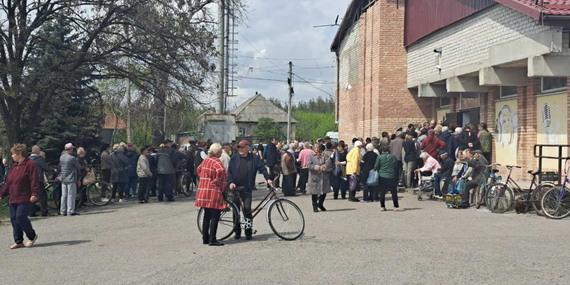Today's top news: Ukraine, Sudan, Central African Republic

Ukraine
The acting Humanitarian Coordinator Matthew Hollingworth condemned a wave of deadly airstrikes earlier today that killed and injured dozens of civilians across the country. Houses and other vital infrastructure were also destroyed.
Mr. Hollingworth said on Twitter that it is inexcusable that civilians – including children – are being killed in their sleep, in places like Uman, which are far from the front lines. He stressed that these indiscriminate attacks on civilian areas must stop.
There were also deadly attacks reported today in Donetsk city, which is currently under Russian control. Russian-installed authorities there said several civilians were killed and injured when a bus and hospital in the city center were hit.
Civilians and civilian infrastructure are protected under international humanitarian law. They must never be targeted.
Violence on the ground has increased, and hostilities are worse than ever this year, especially in areas near the front line in the east and south of the country.
Humanitarian needs here are more acute, and we and our partners are trying to provide as much assistance as possible. Since January, we have organized almost 40 humanitarian convoys to areas as close as a couple hundred meters from the front lines.
Today, our colleagues delivered six truckloads of critical supplies to the 3,000 people remaining in communities around Lyman, in the Donetsk region. This includes medical supplies and enough food to last three months.
And earlier this week, we reached Orikhiv, which is just 10 km from the front line in the Zaporizhzhia region. We delivered water, hygiene and shelter kits for some 1,600 civilians, mostly older people.
They’ve been sheltering in basements to keep safe from shelling, and lack access to markets, electricity, piped water and gas.
Sudan
We continue to deliver assistance whenever and wherever feasible, particularly in the areas of health and nutrition.
The World Health Organization has stocks of essential medicines, blood bags, supplies for surgery and trauma care waiting for delivery once access is safe. Additional cargo of medical supplies is arriving to Port Sudan.
Partners continue to support the operations of 65 health facilities in five states, providing staffing support, medical consumables, supplies and pharmaceuticals.
Local organizations and networks are providing support to people facing gender-based violence. The response for now is largely focused on remote service provision, and some counsellors are offering voluntary support to undertake remote psychosocial services, according to UNFPA.
In Blue Nile, humanitarian partners have been able to keep integrated health and nutrition programmes running.
Refugee camps in Gedaref, Kassala, White Nile and Blue Nile, as well as refugee settlements in South and West Kordofan, are receiving essential services, including health and water. In Gedaref, our partners are providing life-saving services to refugees and the host community.
Meanwhile, in Ag Geneina in West Dafur, the situation is alarming, with further reports of killing of civilians, including medical personnel, on 27 April. The main hospital in the state—Ag Geneina Teaching Hospital—has been directly affected by the fighting in the city.
Sudan/Central African Republic
People continue to flee Sudan to the Central African Republic (CAR).
According to our partners, 3,000 people have crossed the Sudanese border into the village of Am-Dafock in northern CAR and are living in spontaneous settlements. Local authorities the possibility of relocating them to Birao, far from the border region. The dynamic is rapidly changing, and more people are expected to arrive in the country.
The traffic along the border between Sudan and CAR has been disrupted. Sudan is an important supplier of essential commodities in CAR, especially during the rainy season which runs from now to October. The price of commodities has increase and some items such as sugar and millet have seen their price doubled.
Some 120,000 people were already in need of humanitarian assistance in the northern part of the CAR before the clashes in Sudan.
We and our partners are currently assessing the capacity to provide support, with teams having arrived today in Birao. Our partners continue to provide assistance, including emergency medical and nutritional response. Prior to this conflict, the humanitarian presence in this border region was already very limited.
Currently, the most pressing needs include emergency shelter, food and clean water.
